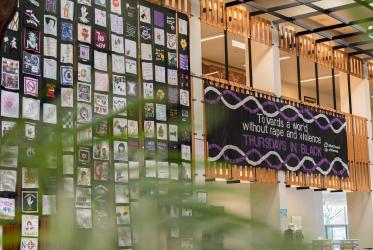Offering opening remarks, Rev. Nicole Ashwood, WCC programme executive of Just Community of Women and Men, shared the history of why the International Day for the Elimination of Violence against Women is observed on 25 November. On that day in 1960, three Dominican political dissidents, the Mirabal sisters, were murdered.
Ashwood commemorated the courage of the three sisters,and invited participants to “be part of the transformation that this world needs.”
Rev. Joy E. Abdul-Mohan, former moderator of the Presbyterian Church of Trinidad and Tobago, shared some best practices in preventing gender-based violence. “It takes place in all racial, socio-economic, and education backgrounds,” she said. “What are we doing or not doing to curb or eliminate gender-based violence? Where have we fallen short?”
She called for educating leaders, educating families, and especially educating pastors and theologians about preventing gender-based violence. “Nonviolence should become a way of life—and violence against women and all creation must stop,” she urged.
Dr Fulata Moyo, international activist, discussed how she began growing the Thursdays in Black campaign to its global significance today. She shared best practices, and addressed issues such as child marriage and stigma.
She also discussed the importance of mentorship, and characterized mentorship not as one person imparting knowledge to another, but a more equal relationship. “We forget that the process of mentorship is really a back-to-back thing,” said Moyo.
Among people she has mentored is Brian Muyunga, a youth member of the World Council of Churches central committee, who described the reaction of his peers when he first began visibly advocating for the prevention of gender-based violence. “It is quite interesting and challenging, the very first attitude I received from my friends,” he said, adding that mentors helped encourage him.
“I believed in their theological perspective,” he said.
Rev. Jyoti Singh, from the National Council of Churches of India, who moderated the webinar, expressed appreciation for all the mentors and mentees involved in the discussion. “Thank you so much for reminding us that we cannot live in our own silos,” she said.
Persons with disabilities more vulnerable
Dr Aiswarya Rao, a pediatrician, shared how girls with disabilities are denied resources from a very early age—and this make them even more vulnerable to gender-based violence. “If you take all of India, the literacy rate of India is 74%—at least 74% of people in India can read and write,” she said. “But here you have one-third of girl children with disabilities who have no access to school at all.”
Rao also encouraged all to keep advocating. “You have to be tenacious, and you have to go on and on and on about it—and sometimes you have to negotiate and sometimes you have to appeal,” she urged.
Rev. Eneless Chilolo, Reformed Church in Zambia, focused on advocating specifically for prevention of gender-based violence for people with disabilities. “I was forced, and I got the courage to stand up and be speaking for them and because of what they were going through,” she said, adding that her advocacy often occurs on a very personal level.
“On my own I just buy some meals sometimes, just buy some things they need for food,” she said. “We keep elevating the community. I just feel they need to be motivated in various ways.”
Singh asked: “How does power—and the misuse of power—play a role in abuse? How do we address it?”
Dr Nontando Hadebe brought a a Catholic voice to this question, saying that the misuse of power is often deep-set in the church. “You even see in very small and subtle ways when people are speaking from the pulpit, nobody is allowed to question them,” she said. “It normalizes inequality and, even among the leaders, they protect each other.”
If you really dig deeper into the history and the dynamics, we see in the sexual abuse scandal in the Catholic Church and even across other denominations, the powerlessness of the laity.
To offset this, Hadebe urged delving into history and theology to find the biblical roots of women in leadership positions.
“You can’t talk about Christmas without women,” she said, adding that not everyone will agree with her.
“There’s a lot of pushback—but that’s normal,” she said.
A call to move forward
Speakers and participants ended the webinar with a call to move forward.
Muyunga said we need to recognize that, when we talk about gender-based violence, women are still the majority of the victims. “Things are changing but men, and even some young people, are still locked into where patriarchy is the ordinary—and they are locked there,” he said.
Moyo noted that we can try to create a world where men and women are not competing. “Let’s live together in a way that each one’s life is supported and is enriched,” she said.
The webinar was co-organized by the National Council of Churches in India and the World Council of Churches. The campaign 16 Days Against Gender-Based Violence runs through 10 December, Human Rights Day.
Watch the Facebook Live recording
Learn more about 16 Days against Sexual and Gender-Based Violence








